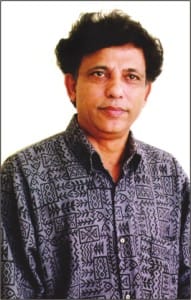<i>Selim Al Deen: A legend</i>

Selim Al Deen
January 14 evening: A news that sent a wave of shock among the people -- the untimely demise of Selim Al Deen, a legendary dramatist in the post-colonial Bangla literature. He passed away at the age of 59; many believe he could contribute more.
People from every corner of the country, in particular the theatre activists, gathered at the Central Shaheed Minar on January 16 morning to pay their tribute to the deceased intellectual. His coffin was covered with the National Flag of Bangladesh. He was later buried on Jahangirnagar University Campus, the place he loved most.
Al Deen, a pioneer of neo-theatre movement in Bangladesh, a theoretician of drama, a scholar, an organiser and a professor of Department of Drama and Dramatics at Jahangirnagar University, developed a 'new drama form' based on the narratives of traditional indigenous theatre.
The playwright had his unique style. His narratives are lyrical and nature appears spontaneously in his plays. The structure of his plays is innovative too.
Al Deen was a founder member of Dhaka Theatre. He, along with Nasiruddin Yousuff, formed Bangladesh Gram Theatre in 1981-82 and Al Deen was its chief adviser.
In the early 1980s Selim Al Deen and his friends of Dhaka Theatre began their search for the roots of Bangla theatre. The question that always ran through Al Deen's mind -- was Bangla theatre only 300 years old? He began his research to trace the origin of Bangla theatre and developed his own style of writing plays based on the (thousands of years old) traditional performing art forms. Shakuntala, Kittonkhola, Keramat Mongol, Hat Hadai, Chaka, Joiboti Koinnar Mon, Horgoj, Bonopangshul, Nimojjon and many other plays by Al Deen are remarkable examples of the narrative style he popularised. His play Horgoj has been translated in the Swedish language.
In 1995, Al Deen completed his PhD from Jahangirnagar University on Medieval Bangla Drama. He also compiled Bangla Natyakosh -- the only anthology of Bangla drama-related terms and forms of traditional theatre. Al Deen's plays are included in the curriculum of University of Dhaka, Jahangirnagar University Jadavpur University and Rabindra Bharati University in India.
Eminent director Nasiruddin Yousuff, who directed most of Al Deen's plays, said, “For the last 35 years, Selim and I have worked together, travelling all over of the country, in search of traditional theatre forms. I've lost my best friend. We established a national theatre form. And Selim Al Deen was its theoretician. He is the first modern playwright in Bangla literature, who went past the colonial mindset and developed a new form of Bangla theatre.”
Yousuff further added that he believes those who share Al Deen's views and values would work to set up a 'World Cultural Centre' -- the playwright's dream.
Eminent poet-playwright Syed Shamsul Haq said, “This is an irreparable loss. He was younger to me and had several queries related to the identity of our culture. He successfully demonstrated our cultural identity through his plays.”
Claiming Selim Al Deen as one of the most prominent playwrights in Bangla literature, playwright-director-organiser Mamunur Rashid said, “Al Deen revived and developed many traditional theatre forms that were on the verge of extinction. I do admit I was intimidated by his superior skills as a playwright and each time I tried my best to compete with him. I've lost the one who challenged and encouraged my creativity.”
Eminent TV play director Atiqul Haque Chowdhury, the producer of Al Deen's first TV play Ghum Nei, aired in 1970, said, “All stage plays are not considered 'literature'. Al Deen's plays have enriched our literature in more ways than one. He was a world-class playwright.”
Not only in Bangladesh, Al Deen is equally popular in Kolkata. Kolkata-based theatre personalities including Rudraprasad Sengupta and Usha Ganguli were great admirers of Al Deen's works. Nowadays many Kolkata-based theatre troupes stage plays written by him.
Upon receiving the news of Al Deen's death, in an email to Nasiruddin Yousuff, Rudraprasad Sengupta wrote, “Al Deen was a remarkable playwright by any standard, be it national or international. So many times, both here (Kolkata) and in Dhaka, we all leapt with joy or drowned in despair as we experienced the magic and mystique of his words.”
Several actors consider their roles in Al Deen's plays unforgettable. Actor Shahiduzzaman Selim said, “I had known him since I was a student of Jahangirnagar University. Acting in his plays – Kittonkhola, Keramatmongol, Bonopangshul, Hat Hadai and Prachya -- groomed me as an artiste. I acted in Al Deen's play Shokuntala and later directed it for Jahangirnagar Theatre. Moreover, I've directed a mega-serial, Protnonari, written by Al Deen. Since then I haven't directed any new TV serial, as I haven't come across a script like that.”
Al Deen's demise is not only a loss for our theatre, but also for the academicians. His colleague at the Department of Drama and Dramatics, Professor Afsar Ahmed, said, “We worked together for three decades. He was a wonderful teacher, theoretician, researcher and scholar. We've lost a guardian. But, I believe, our department would be able to establish his theories.”
Theatre actor-director Aly Zaker believes that we can realise Al Deen's vision. He said, “Selim worked tirelessly to give a distinct identity to Bangladeshi theatre, but he could not see the anthology of his works. Many of his plays are yet to be staged. What is also encouraging is that he has created a good number of talented disciples who can continue Al Deen's legacy.”
The drama legend was honoured with several prestigious national and international awards, including the Bangla Academy Literature Award, National Film Award, Ekushey Padak and Olokto Shahitya Puroshkar.

 For all latest news, follow The Daily Star's Google News channel.
For all latest news, follow The Daily Star's Google News channel. 



Comments